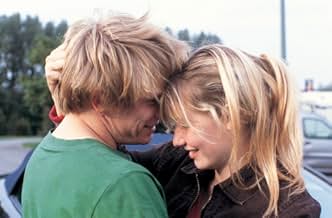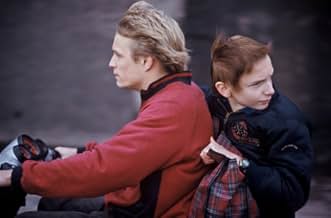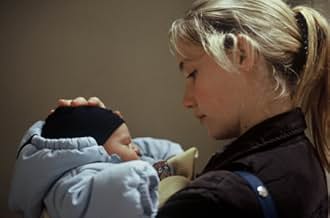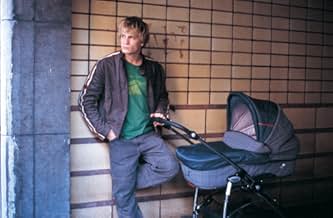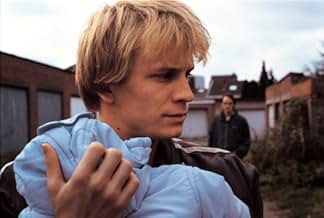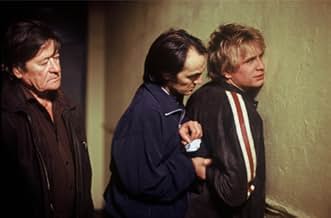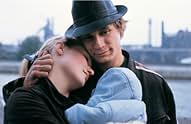CALIFICACIÓN DE IMDb
7.4/10
20 k
TU CALIFICACIÓN
Agrega una trama en tu idiomaBruno and Sonia, a young couple living off her benefit and the thefts committed by his gang, have a new source of money: their newborn son.Bruno and Sonia, a young couple living off her benefit and the thefts committed by his gang, have a new source of money: their newborn son.Bruno and Sonia, a young couple living off her benefit and the thefts committed by his gang, have a new source of money: their newborn son.
- Dirección
- Guionistas
- Elenco
- Premios
- 14 premios ganados y 21 nominaciones en total
Anne Gerard
- Commerçante
- (as Anne Gérard)
Leon Michaux
- Policier Commissariat
- (as Léon Michaux)
- Dirección
- Guionistas
- Todo el elenco y el equipo
- Producción, taquilla y más en IMDbPro
Opiniones destacadas
L'infant belongs to Sophie and Bruno, both feckless, petty criminals, in a seedy Belgian city. She has just come out of prison (?)with the newborn. She goes to their apartment but finds that Bruno has sublet the place to a bilious couple, so she has to track Bruno down at work trying to cadge small change from passers by. He is pleased to see her but diffident towards his son: Jimmy.
They spend the night in a shelter, or rather she does, as he cuts his time short to fence his stolen goods to a woman who drops a hint that if they're not up to raising a child they could adopt it out for a good price.
After showing us how they can only seem to communicate through adolescent rough housing, we are left with the distinct impression that they are too immature for parenthood. A few days later, while they wait in line, Bruno offers to walk the baby. He then sells it to a baby selling gang, and returns to show Sophie the wad of cash. Sophie passes out from shock.
We see not one wit of shame or guilt from Bruno up to this point. He is, we presume, an amoral street thug, out for how to make the next buck, and found the baby to good an opportunity to pass up for a sizable reward. Besides, given the empty life the baby will be looking forward to, the adoption by a better off couple doesn't seem to be bad for the child.
Sophie passing out seems to bring him to his senses. Is he remorseful? Does he love her? Up to this point all we have seen of their relationship is one of two vapid adolescent children, with no hint of any plans to make a future for their off-spring.
He carries her to a hospital and starts calling his go between to have the deal undone. At this point his motivation is left deliberately unclear. Is he doing so because he regrets his actions and needs to make it up to Sophie, or is he doing it because her accusations are over heard by the staff and the police will soon be carting him off to jail? In any event he manages to get the child back, giving up the E5,000 without a whimper, but then faces the angry brokers who are now out their E5,000. When he returns to the hospital with the baby the police are there and he makes up the story that he was just pretending to sell the child as revenge for her infidelity, and then calmly disowns the child as his.
Sophie refuses to talk with him and the police have to back off, and at this point in the movie we are no clearer to discerning any hint of empathy stirring in Bruno's pock marked face. I felt sorry for Sophie in her realization that her lover is as calloused as his feet, but presumed she would soon allow him back into her life. Yet as morally revolted as I was by Bruno, I still wanted to see if he could manage some kind of redemption.
The movie ends in leaving us to answer that question ourselves.
The crux of the movie is Bruno's character, or lack of it. He is no sociopath; he is not evil; his bland personality is as banal and unattractive as cold soup. He seems to not be dangerous, until faced with too much temptation to his greed. Yet he is difficult to hate. He is like that black sheep relative we all have and shake our heads about, so that we can whistle past the graveyard of our own inadequacies. He is what humanity can become when the spirit slumbers. He is society's unwitting sin eater.
They spend the night in a shelter, or rather she does, as he cuts his time short to fence his stolen goods to a woman who drops a hint that if they're not up to raising a child they could adopt it out for a good price.
After showing us how they can only seem to communicate through adolescent rough housing, we are left with the distinct impression that they are too immature for parenthood. A few days later, while they wait in line, Bruno offers to walk the baby. He then sells it to a baby selling gang, and returns to show Sophie the wad of cash. Sophie passes out from shock.
We see not one wit of shame or guilt from Bruno up to this point. He is, we presume, an amoral street thug, out for how to make the next buck, and found the baby to good an opportunity to pass up for a sizable reward. Besides, given the empty life the baby will be looking forward to, the adoption by a better off couple doesn't seem to be bad for the child.
Sophie passing out seems to bring him to his senses. Is he remorseful? Does he love her? Up to this point all we have seen of their relationship is one of two vapid adolescent children, with no hint of any plans to make a future for their off-spring.
He carries her to a hospital and starts calling his go between to have the deal undone. At this point his motivation is left deliberately unclear. Is he doing so because he regrets his actions and needs to make it up to Sophie, or is he doing it because her accusations are over heard by the staff and the police will soon be carting him off to jail? In any event he manages to get the child back, giving up the E5,000 without a whimper, but then faces the angry brokers who are now out their E5,000. When he returns to the hospital with the baby the police are there and he makes up the story that he was just pretending to sell the child as revenge for her infidelity, and then calmly disowns the child as his.
Sophie refuses to talk with him and the police have to back off, and at this point in the movie we are no clearer to discerning any hint of empathy stirring in Bruno's pock marked face. I felt sorry for Sophie in her realization that her lover is as calloused as his feet, but presumed she would soon allow him back into her life. Yet as morally revolted as I was by Bruno, I still wanted to see if he could manage some kind of redemption.
The movie ends in leaving us to answer that question ourselves.
The crux of the movie is Bruno's character, or lack of it. He is no sociopath; he is not evil; his bland personality is as banal and unattractive as cold soup. He seems to not be dangerous, until faced with too much temptation to his greed. Yet he is difficult to hate. He is like that black sheep relative we all have and shake our heads about, so that we can whistle past the graveyard of our own inadequacies. He is what humanity can become when the spirit slumbers. He is society's unwitting sin eater.
10Dengoku
Earlier this evening, I was attending the premiere of "L'Enfant" in Belgian theaters.
"L'Enfant" shows us a socio-drama, with a story located in the southern region of Belgium, in a city called Seraing, where most movies of the Dardenne brothers are situated.
I will not go into any plot summaries, but let me make a comparison with other directors, so you might get a clue if you'd like to watch this movie or not. Socio-drama is a genre in film not only made in Belgium. Many great directors have made solid socio-drama's: Aki Kaurismaki, Ken Loach, Mike Leigh and many others.
Where you can find a twist of humor in Kaurismaki's movies, you'll have a hard time finding it in "L'Enfant". A high level of realism avoids any dramatization of the struggle-for-life the protagonists experience. This makes it for the viewer not easier to swallow. The absence of a soundtrack even increases this effect.
This movie has many strong points, and although I haven't seen many of the other films who were competing with "L'Enfant" at the Cannes film festival 2005, I think this film has fairly won the Palme d'Or because it scores very high on the essential aspects of film-making: acting, camera-work (see comment by Toon Creemers) and script (dialogues).
I highly recommend this movie, but don't expect to be visually entertained the way we are used to by big budget films from Hollywood. Movies like these don't need a lot of dialogue, fancy one-liners or historical quotes - the picture says it all, in a simple but effective way.
Enjoy,
"L'Enfant" shows us a socio-drama, with a story located in the southern region of Belgium, in a city called Seraing, where most movies of the Dardenne brothers are situated.
I will not go into any plot summaries, but let me make a comparison with other directors, so you might get a clue if you'd like to watch this movie or not. Socio-drama is a genre in film not only made in Belgium. Many great directors have made solid socio-drama's: Aki Kaurismaki, Ken Loach, Mike Leigh and many others.
Where you can find a twist of humor in Kaurismaki's movies, you'll have a hard time finding it in "L'Enfant". A high level of realism avoids any dramatization of the struggle-for-life the protagonists experience. This makes it for the viewer not easier to swallow. The absence of a soundtrack even increases this effect.
This movie has many strong points, and although I haven't seen many of the other films who were competing with "L'Enfant" at the Cannes film festival 2005, I think this film has fairly won the Palme d'Or because it scores very high on the essential aspects of film-making: acting, camera-work (see comment by Toon Creemers) and script (dialogues).
I highly recommend this movie, but don't expect to be visually entertained the way we are used to by big budget films from Hollywood. Movies like these don't need a lot of dialogue, fancy one-liners or historical quotes - the picture says it all, in a simple but effective way.
Enjoy,
Dramatic, realistic, proposing honest portrait of an age, generation, near reality. A film about parenthood. Bitter, cold, well made. And about the build of responsability. All - gived in wise manner. With admirable force. A father. His son. A decision. And the transformation. And the price of option.
When the single mother Sonia (Déborah François) returns home with her newborn son, she finds that the baby's father Bruno (Jérémie Renier) had rented her apartment for a couple. She seeks out Bruno, who is a small time young thief that has a gang with two other teenagers, on the streets and they go to a shelter to stay during the cold night. On the next morning, they register the child with the name of Jimmy. When Bruno receives a proposal from his dealer for selling Jimmy for adoption for five thousand Euros, he steals the baby and sells him to his contact. However, when Sonia discovers what Bruno did, she faints, goes to the hospital and reports the transaction to the police. Bruno calls off the transaction and retrieves Jimmy, but has to pay to the dealers another five thousand Euros, in the beginning of his descent to hell and final redemption.
The low-budget "L'Enfant" is actually the realistic story of Bruno, an indifferent and alienated young scum originated from the upper class but without job for option that steals, lies, manipulates, wanders on the streets and seems incapable of displaying love, remorse or any other human feelings. Sonia is not well developed and the viewer never knows who she actually is and why she felt in love for Bruno. Jérémie Renier and Déborah François have awesome performances in the lead roles. The conclusion is disappointing since the final redemption of Bruno is inconsistent with his character. Maybe the intention of the writers and directors Jean-Pierre and Luc Dardenne is to give some hope to the audience instead of the expected dark and credible ending. My vote is eight.
Title (Brazil): "A Criança" ("The Child")
The low-budget "L'Enfant" is actually the realistic story of Bruno, an indifferent and alienated young scum originated from the upper class but without job for option that steals, lies, manipulates, wanders on the streets and seems incapable of displaying love, remorse or any other human feelings. Sonia is not well developed and the viewer never knows who she actually is and why she felt in love for Bruno. Jérémie Renier and Déborah François have awesome performances in the lead roles. The conclusion is disappointing since the final redemption of Bruno is inconsistent with his character. Maybe the intention of the writers and directors Jean-Pierre and Luc Dardenne is to give some hope to the audience instead of the expected dark and credible ending. My vote is eight.
Title (Brazil): "A Criança" ("The Child")
L'Infant is extraordinary surprising. I never had seen a Belgian movie so I was very curious about this when I was in the theater.
The script is about 2 young youths that aren't yet mature already carrying the burden of taking care of their own baby. Unemployed, without any good prospect of a real future, school droppers and not having reached maturity, they went on living just for the moment. The father is just a young, dull and irresponsible teenager that lives thru schemes and small petty crimes. The mother, looking as a 12 years old girl, thrives to support the child and don't discourage the way of living of her "husband", seen by her as fair and needed to aid their life.
The film focuses also on the illegal and dark commerce of adoption and selling of children, which is by the way what the boy will do to gain a load of money...
The movie then runs to decadence, regret, awareness of childish mistakes and bad options that, without surprise, would lead to an expected nightmare... jail.
Great acting, fair dialog(Due to the content of the story) and a voyage to the sorrow for the misfortunes of these 2 child-parents.
The script is about 2 young youths that aren't yet mature already carrying the burden of taking care of their own baby. Unemployed, without any good prospect of a real future, school droppers and not having reached maturity, they went on living just for the moment. The father is just a young, dull and irresponsible teenager that lives thru schemes and small petty crimes. The mother, looking as a 12 years old girl, thrives to support the child and don't discourage the way of living of her "husband", seen by her as fair and needed to aid their life.
The film focuses also on the illegal and dark commerce of adoption and selling of children, which is by the way what the boy will do to gain a load of money...
The movie then runs to decadence, regret, awareness of childish mistakes and bad options that, without surprise, would lead to an expected nightmare... jail.
Great acting, fair dialog(Due to the content of the story) and a voyage to the sorrow for the misfortunes of these 2 child-parents.
¿Sabías que…?
- TriviaJimmy is played by 40 different babies.
- ConexionesFeatured in Smagsdommerne: Episode #3.17 (2006)
Selecciones populares
Inicia sesión para calificar y agrega a la lista de videos para obtener recomendaciones personalizadas
- How long is The Child?Con tecnología de Alexa
Detalles
- Fecha de lanzamiento
- Países de origen
- Sitios oficiales
- Idioma
- También se conoce como
- The Child
- Locaciones de filmación
- Rue de la Banque, Seraing, Liège, Wallonia, Bélgica(Sonia's apartment exteriors)
- Productoras
- Ver más créditos de la compañía en IMDbPro
Taquilla
- Presupuesto
- EUR 3,600,000 (estimado)
- Total en EE. UU. y Canadá
- USD 651,941
- Fin de semana de estreno en EE. UU. y Canadá
- USD 44,537
- 26 mar 2006
- Total a nivel mundial
- USD 5,507,396
- Tiempo de ejecución1 hora 35 minutos
- Color
- Mezcla de sonido
- Relación de aspecto
- 1.66 : 1
Contribuir a esta página
Sugiere una edición o agrega el contenido que falta

Principales brechas de datos
What is the Mexican Spanish language plot outline for L'enfant (2005)?
Responda

